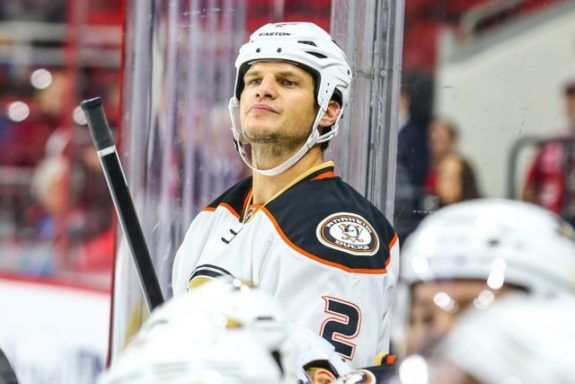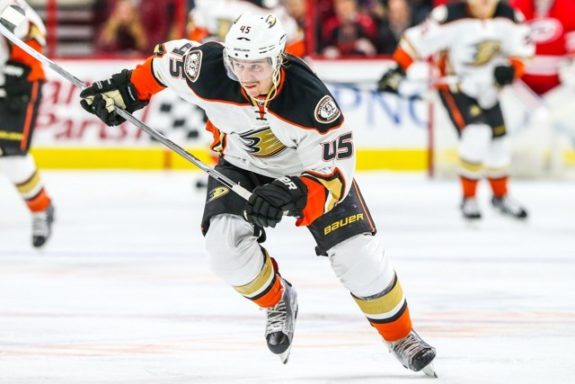The Anaheim Ducks were always going to be in a difficult spot heading into the expansion draft. Now, things might be even more precarious for them, but strangely, the enhanced difficulty and additional potential losses would be their own fault.
Bieksa Not Waiving…and Not Being Bought Out?
It appears that the Ducks did not even ask declining veteran defenseman Kevin Bieksa to waive his no-movement clause (NMC) for purposes of the expansion draft. Bieksa not waiving his NMC means he will be protected and thus take up a valuable slot that could and should be used on one of the Ducks’ younger and better blueliners.
Of course, Anaheim could always buy out Bieksa’s contract. Even though his age-35-plus contract means that the Ducks would still be hit with his full $4 million cap hit, it’s something they could live with because A) it’s just for one more year; B) he does not contribute much anymore given his decline and the Ducks’ other talent ahead of him on the depth chart, so the cap hit is already largely dead space, as harsh as that might sound; and C) that price is well worth the Ducks being able to hold on to key players and other assets.
A buyout, however, also does not seem to be likely, given TSN reporter Bob McKenzie’s phrasing of the situation.
It's believed ANA has a pre-arranged deal in place with VGK so it isn't necessary to ask Kevin Bieksa to waive his NMC.
— Bob McKenzie (@TSNBobMcKenzie) June 13, 2017
If a deal in place with the Vegas Golden Knights is what made the Ducks think it “isn’t necessary” to ask Bieksa to waive his NMC, then that suggests that they don’t think it’s necessary to buy him out either. After all, why wouldn’t the Ducks at least ask Bieksa to waive his NMC before resorting to a buyout? If this is indeed the case and Bieksa will remain on the roster, then the Ducks are making a major mistake.
A Bieksa Buyout Is the Logical Route
The ripple effects of keeping Bieksa on the roster and thus protecting him would not be good in pretty much any realistic scenario. Let’s say the deal with Vegas involves Sami Vatanen being traded to the Golden Knights or some other team. That still leaves Anaheim needing to protect Hampus Lindholm, Cam Fowler, and Josh Manson.
They could trade another one of those defenseman (perhaps Fowler, who will be due a hefty raise after the 2017-18 season), but that means they would already losing two of their best defenders. So for the sake of argument, let’s scratch that scenario and assume the trio of Fowler, Lindholm, and Manson will all be protected. With Bieksa already protected as well, that would mean the Ducks could only protect four forwards.

Ryan Getzlaf, Ryan Kesler, and Corey Perry are core veterans with NMCs, so they will be protected. That would put the Ducks in the undesirable situation of leaving the talented and ever-improving Jakob Silfverberg exposed, assuming the fourth forward spot goes to Rickard Rakell.
Of course, the deal in place with the Golden Knights could involve an agreement whereby Silfverberg is not selected, with Vegas instead taking a player the Ducks are more willing to lose. Even in this situation, the Ducks would not be making the best of their predicament. If Vatanen is shipped to a team other than the Golden Knights, then the Ducks would be giving up additional assets to in exchange for the Golden Knights selecting a certain player (i.e., not Silfverberg). So they would be losing Vatanen, another player (albeit one of their choosing) to Vegas in the expansion draft, and other assets like a draft pick or a prospect in the pre-arranged deal with Vegas.
If the deal is for the Golden Knights to select Vatanen, then the Ducks would also have to add in that draft pick/prospect sweetener to steer the Knights that way. If the deal involves Vatanen actually being traded to Vegas with the stipulation that the Golden Knights would select a certain other agreed-upon player in the actual expansion draft, that would still be sub-optimal for the Ducks. They would be losing Vatanen and another player, whereas they could just leave Vatanen exposed if they bought out Bieksa, and lose him in the draft but not have to give up any other assets.

Then again, the Ducks could theoretically get a nice return for Vatanen via trade to help offset some of their losses. Still though, the optimal scenario here comes back to buying out Bieksa, whose deteriorating game really does not provide value to the Ducks’ blue line. They could still trade Vatanen to get assets back, and then they would only lose him and a lesser player in the expansion draft because of the increased protection flexibility they would have.
Anaheim would not have to throw in any draft pick or prospect sweeteners to push Vegas to take a certain player. They would instead be able to move to the seven forwards/three defensemen scheme and protect both Silfverberg and two more forwards in addition to Getzlaf, Kesler, Perry, and Rakell (Andrew Cogliano, a valuable depth player, would presumably be one of them). They would also still have room to hold on to Lindholm, Fowler, and Manson on the back end.
There is no need for the Ducks to sweeten the pot for Vegas at all. They don’t need to lose extra assets. A simple buyout of Bieksa’s contract and a digestible one-year penalty on the salary cap would ultimately give them greater flexibility through the expansion draft. It’s a price they should be willing to pay.